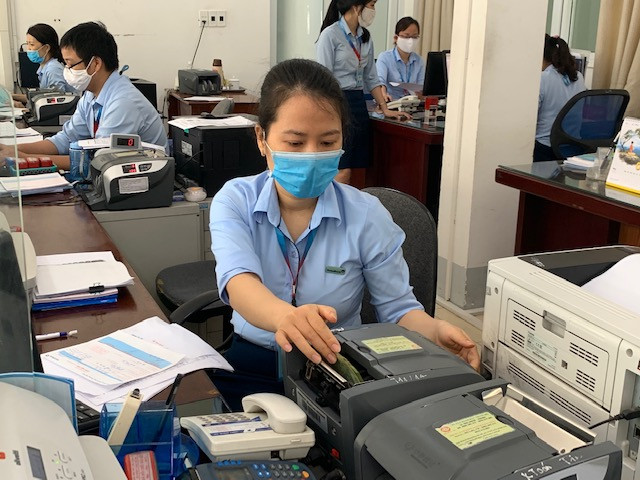Strengthening the legal system and ensuring the safe operations of credit institutions
(Baonghean.vn) - Commenting on the draft Law on Credit Institutions (amended), credit institutions in Nghe An province contributed many important opinions, focusing on strengthening the legal system and ensuring the safety of the banking system's operations.
Need to amend
The Law on Credit Institutions has made important contributions to management as well as creating a stable legal environment for the operation of the banking system. However, after more than 12 years of implementation, the regulations on organization, administration, management and operation of credit institutions have some problems with other laws: Enterprise Law, Cooperative Law; some operations of credit institutions have not been regulated in the law, causing difficulties in implementation, for example: treasury operations, payment agency operations, etc.
 |
The Law on Credit Institutions (amended) sets the top priority goal of ensuring system safety and strengthening people's trust in the banking system. Photo: Thu Huyen |
The Law on Credit Institutions was issued in 2010. Up to now, related Laws have been newly issued, amended, supplemented, and replaced, such as: Law on Enterprises, Law on Investment, Law on Management and Use of State Capital Invested in Production and Business at Enterprises, etc. Therefore, some provisions in the Law on Credit Institutions need to be considered for amendment and supplement to ensure consistency with the provisions of the above Laws.
The Draft Law on Credit Institutions (amended) consists of 10 chapters and 200 articles regulating the establishment, organization, operation, special control, reorganization, dissolution, and bankruptcy of credit institutions; the establishment, organization, and operation of foreign bank branches and representative offices of foreign credit institutions and other foreign organizations with banking activities; the handling of bad debts and the handling of collateral assets of bad debts; the establishment, organization, operation, reorganization, dissolution, bankruptcy, handling of bad debts and the handling of collateral assets of bad debts of the Policy Bank shall be implemented in accordance with the Government's regulations. The Draft Law inherits the current Law on Credit Institutions and adds 1 chapter on the handling of bad debts and collateral assets of bad debts.
According to Ms. Nguyen Thi Thu Thu - Director of the State Bank of Nghe An branch, commenting on the draft Law on Credit Institutions (amended) this time is necessary and has important significance in ensuring the safety of the system, economic development, and innovation of banking activities according to the key tasks of restructuring the economy according to the orientation, viewpoints, and goals of the Party, the National Assembly, and the Government. Thereby, contributing to the healthy operation of credit institutions, perfecting the legal basis to protect the legitimate rights and interests of depositors; creating a clear and transparent legal corridor, helping people to conveniently access banking services...
 |
Transaction at a bank in Vinh city. Photo: Thu Huyen |
Ensuring safety of credit operations
Recently, at the conference to collect comments on the draft Law on Credit Institutions (amended) organized by the Provincial National Assembly Delegation in coordination with the State Bank of Nghe An branch, delegates contributed many important opinions. The opinions focused on regulations on the organization, administration and management of credit institutions; regulations on e-banking activities and regulations on ensuring the safety of credit institutions' operations; regulations on handling bad debts and handling collateral of bad debts; regulations on restructuring weak credit institutions; regulations on managing, closing and opening bank accounts...
Representatives of banks emphasized that the rights and responsibilities of borrowers must be clearly and precisely defined in the Law on Credit Institutions (amended). In particular, the responsibilities of borrowers must be detailed to avoid evading responsibility and easily handle the problem of bad debts of banks...
For example, Article 93, Clause 4 and Clause 5, credit institutions have the right and obligation to inspect and supervise the use of loan capital and debt repayment by customers. Regarding this content, Mr. Le Hong Quang - Director of Vietcombank Vinh Bank commented: Customers are responsible for using loan capital for the committed purpose, repaying principal, interest, and fees in full and on time as agreed. Customers are obliged to cooperate with credit institutions and are responsible for the information provided by customers during the process of inspecting and supervising the use of credit facilities by customers. Credit institutions have the right to inspect and supervise the use of loan capital and debt repayment by customers, requesting borrowers to report on the use of loan capital and provide documents proving that the loan capital is used for the correct purpose of borrowing.
“I propose to amend the regulation on the obligation to inspect and supervise the use of loan capital, but only stipulate that inspecting and supervising loan capital is the right of the credit institution and the use of loan capital for the right purpose must be the obligation and responsibility of the borrower. In reality, it is not feasible to inspect the use of loan capital for all loans, especially small value loans via electronic channels, overdraft loans, loans fully secured by highly liquid assets, etc. According to the new trend, credit institutions should proactively regulate the inspection of loan capital use in accordance with each type of customer, purpose, loan value as well as warning models built with the goal of ensuring the safety of credit institutions' loans,” Mr. Quang suggested.
 |
| Regulations on e-banking activities and regulations to ensure the safety of credit institutions are issues currently being raised. Photo: Thu Huyen |
Commenting on Article 93, Clause 5 of the draft, which stipulates that credit institutions have the right to request borrowers to report on the use of loan capital and provide documents proving that the loan capital is used for the right purpose; Mr. Le Hong Quang - Director of Vietcombank, Vinh branch, proposed: With Article 93, Clause 5 of the draft, it stipulates: Credit institutions have the right to request customers to report on the use of loan capital and provide documents proving that the loan capital is used for the right purpose. I propose to amend and supplement: credit institutions have the right to request customers to report on the use of loan capital and provide documents and data proving it. It is suggested to add the phrase "data" to be consistent with the granting of credit through electronic means.
In Section a, Clause 2, Article 93 of the draft, credit approval and loan use inspection, it is necessary to clearly stipulate how small a loan for living needs is so that credit institutions can easily implement the provisions of the Law.
Regarding the regulation on credit granting restrictions in Article 126 of the draft: Credit institutions are not allowed to grant unsecured credit or credit with preferential conditions to the following subjects: credit appraisers and approvers at that credit institution; Ms. Ly said that this content should be removed, because the number of people appraising and approving credit is quite large, as this is a major business of the bank. In the credit approval process, the stages have been separated to ensure no conflicts of interest, so the credit appraiser and approver is just a professional position like other businesses: credit proposal, disbursement, transaction officer...
 |
| Many opinions say that it is necessary to create conditions for credit institutions to handle property disputes and shorten the handling of bad debts. In the photo: A household in Nghi Phu commune, Vinh city mortgaged real estate to borrow capital from VPbank but has not yet been able to handle it. Photo: Thu Huyen |
In particular, the issue of bad debt settlement has attracted the attention of many banks. Mr. Tran Van Duc - Deputy Director in charge of Agribank Nghe An branch shared: Bad debt settlement is a matter of great concern to the branch level. Resolution 42 on piloting bad debt settlement approved by the National Assembly officially took effect from August 15, 2017. This is a very important legal document, giving banks the right to handle assets; legal problems of the banking industry related to bad debt settlement and collateral for debts of credit institutions that have lasted for many years have been resolved. Thereby, creating a synchronous, effective and feasible settlement mechanism to quickly and completely handle bad debt of credit institutions. However, it is necessary to supplement the law to create conditions for credit institutions to have the opportunity to handle property disputes, shorten the settlement of bad debt...
Bank representatives said that there needs to be a clear and transparent legal framework to protect lenders and secured parties in cases where borrowers are unable to repay their debts or delay in fulfilling their debt repayment obligations to credit institutions.
The leader of the State Bank of Nghe An province branch said that the issue of financial education and risk warning is being rectified and overcome by the bank. The viewpoint and goal throughout the direction is to ensure the legitimate rights and interests of depositors; the top priority is to ensure system safety and strengthen people's trust in the banking system.


